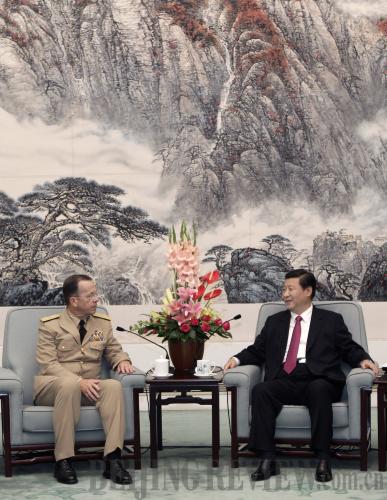|
 |
|
CORDIAL TALKS: Chinese Vice President Xi Jinping meets Chairman of the U.S. Joint Chiefs of Staff Mike Mullen in Beijing on July 11 (PANG XINGLEI) |
Chairman of the U.S. Joint Chiefs of Staff Mike Mullen's recent visit to China constituted an important part of the improving Sino-U.S. military relationship, but their core differences, including the South China Sea issue, cannot be easily ironed out, said Chinese analysts.
"Since Chinese President Hu Jintao's visit to the United States in January this year, military relations between the two countries have been on a path of improvement," said Tao Wenzhao, a research fellow on U.S. studies with the Chinese Academy of Social Sciences (CASS).
Mullen completed his four-day visit on July 13. It was a reciprocal visit following the trip of Chen Bingde, Chief of the General Staff of the Chinese People's Liberation Army (PLA), to the United States in May.
Transparency
Mullen's visit showed Sino-U.S. military exchanges had returned to normal and made headway, said Yuan Peng, Director of the Institute of American Studies at the China Institutes of Contemporary International Relations.
The Chinese Government suspended military talks with the United States after Washington announced an arms sales package to Taiwan in January 2010. Talks were not resumed until Chinese Defense Minister Liang Guanglie met then U.S. Secretary of Defense Robert Gates in Hanoi nine months later. Ensuing exchanges, including Gates' visit to China in January this year and the holding of the Sino-U.S. Strategic Security Dialogue in Washington, D.C. in May, further advanced bilateral military ties.
Moreover, the launch of Sino-U.S. Asia-Pacific consultations in June enabled both sides to engage in deeper and broader exchanges on regional issues, Yuan said.
The agenda China arranged for Mullen during his visit featured high-level meetings, military base visits demonstrating the PLA's openness, and multiple forms of exchanges, said Luo Yuan, a research fellow with the PLA Academy of Military Science.
Mullen met a number of senior Chinese officials, including Chen, Liang and Vice President Xi Jinping. His visit to the Second Artillery Force Headquarters in Beijing on July 10, in particular, showed the PLA's increasing transparency to the United States.
As a sensitive unit that controls China's strategic missiles and nuclear arsenal, the Second Artillery Force has long limited its access to U.S. officials, said Wu Xinbo, a professor with the Center for American Studies at Shanghai's Fudan University.
In recent years, however, several U.S. military officials have been invited to visit its headquarters, including former U.S. defense secretaries Donald Rumsfeld in 2005 and Gates in January this year.
During his stay in China, Mullen also observed an anti-terror drill conducted by a mechanized infantry unit stationed near Hangzhou, the capital city of Zhejiang Province. He visited an air force base in Shandong Province and a submarine base in Ningbo, Zhejiang Province, as well.
| 